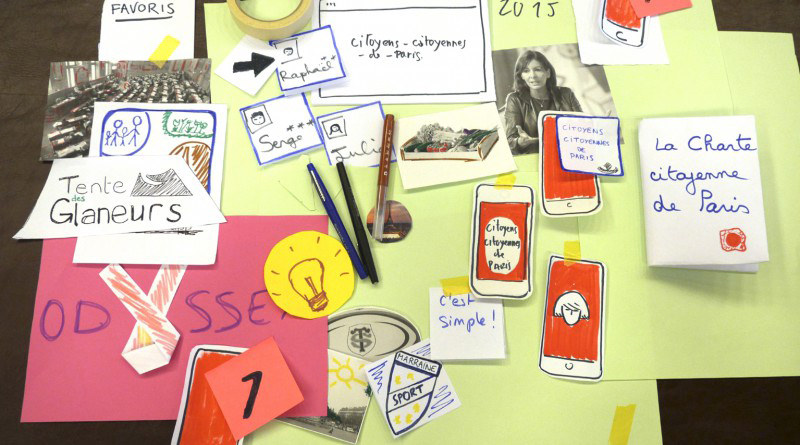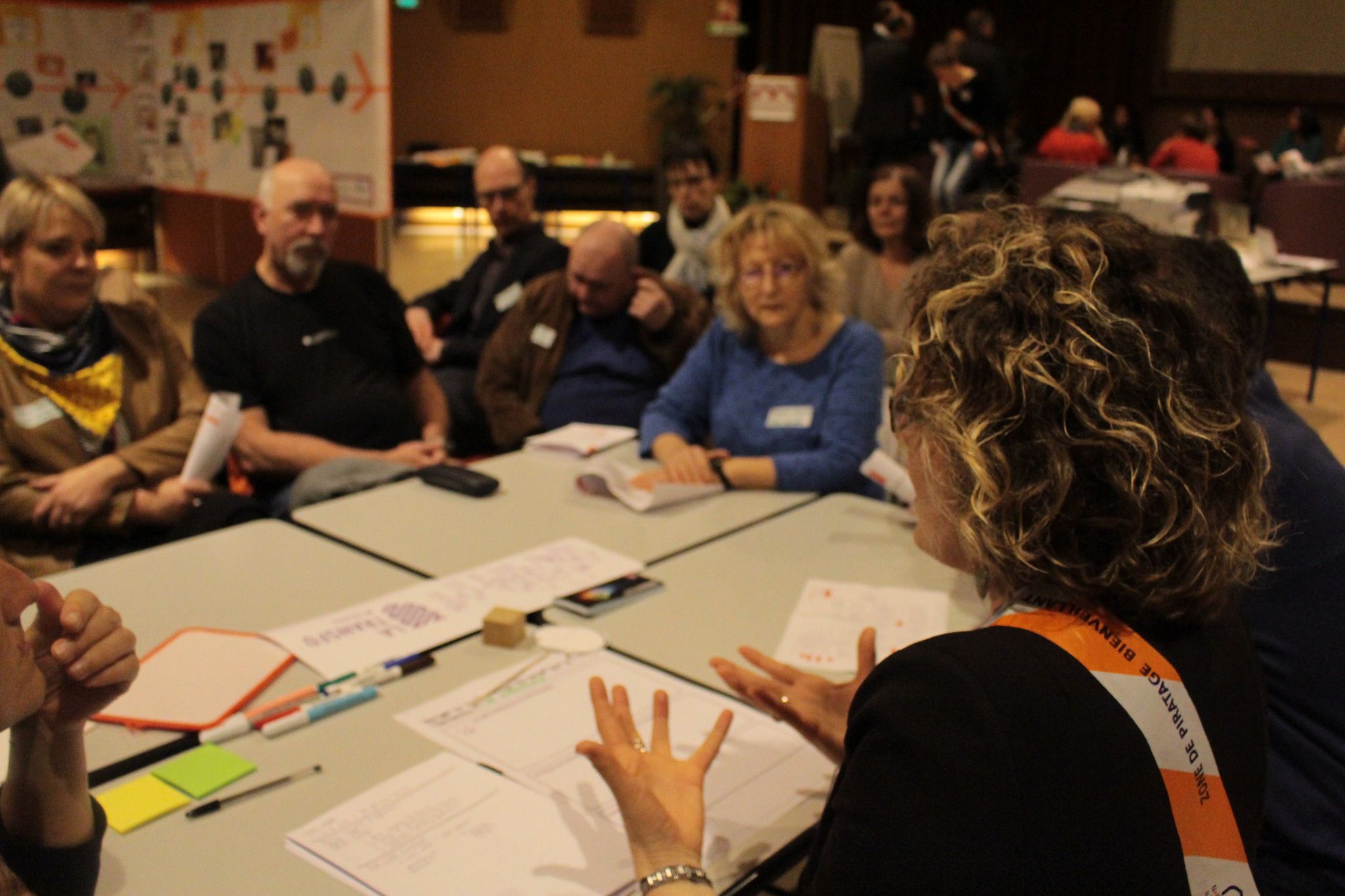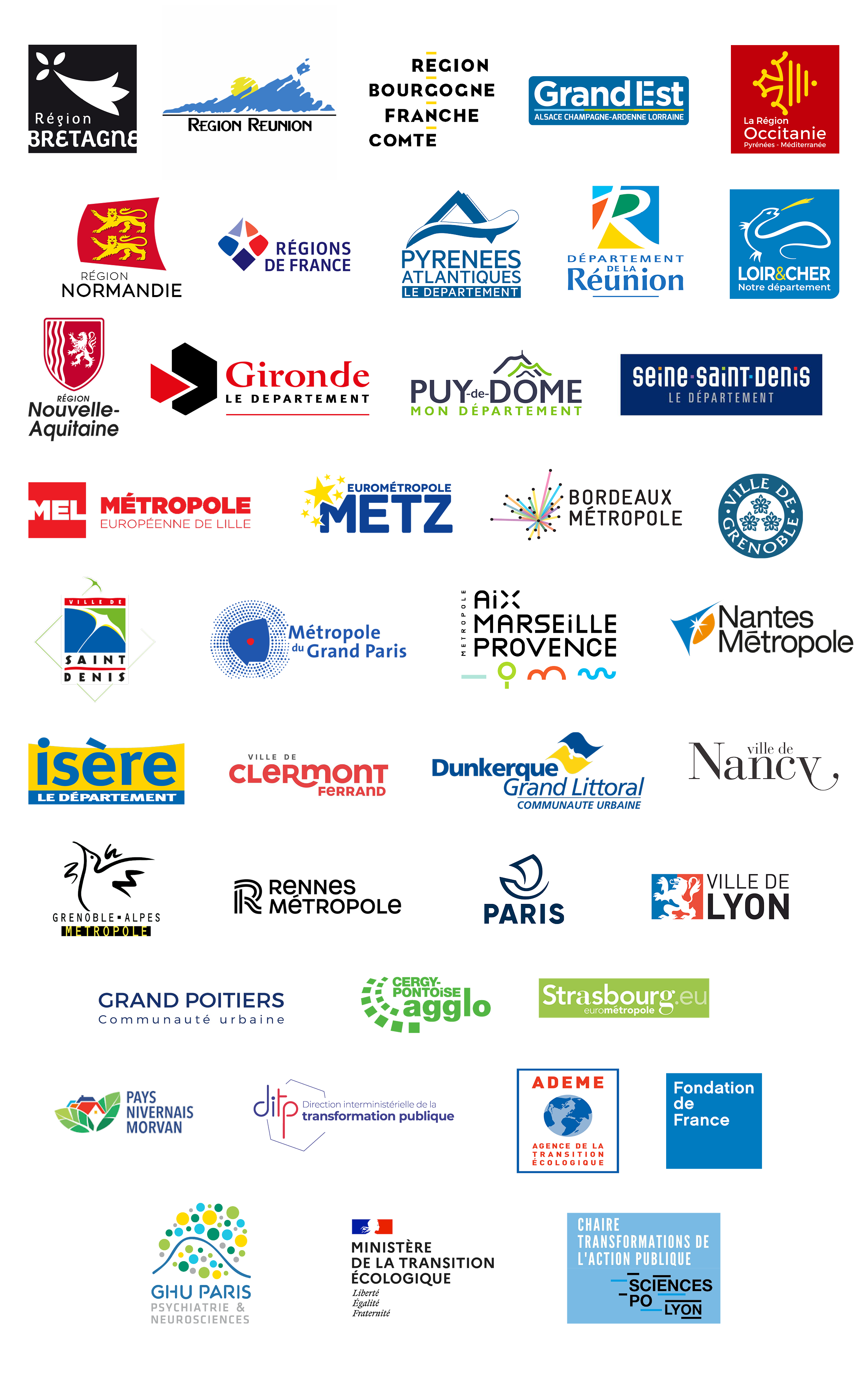While La Transfo in Dunkirk and Occitanie just started in March, La Transfo Mulhouse and Paris are now already half way through; the work on the first practical cases provides the opportunity of a first feedback on the experience, to look at how these cases contribute to draft in each municipality the outlines of the future innovation Lab: modes of action, working methods, culture.
In Paris, the first practical case was the Carte Citoyenne-Citoyen (Paris Citizen Card). Created on the initiative of Mayor Anne Hidalgo, it was launched in January 2015 as a strong symbolic gesture from the Municipality in the context of Charlie Hebdo terrorist attacks. It has the double ambition to bring together the Parisians and to assert the French Republican values. Given free of charge to every inhabitant who requests it and sent automatically to Parisian pupils, it gives access to a variety of civic and cultural offers from the municipality. One year after its implementation, there hasn’t been any evaluation of its real use and its perception by the Parisians, which makes it particularly interesting for the ambassadors
3 dedicated sessions allowed the Ambassadors to collectively map Parisian “sites” of citizenship practices, to lead a number of field surveys and interviews with users and stakeholders (including city halls, libraries, associations, the department of citizen participation, etc.) on the topic of Citizenship in Paris. Such fieldwork allowed to collect ideas, to create empathy, to reconnect political intuition and local realities. The ambassadors debated broadly the topic, imagined creative ways of improvement (by playing with ‘And if … ‘) and new user scenarios (by means of an unusual tool, a vidéocagette) for the Card. They finally tried various modes of synthesis and presentation of the findings (moving exhibition, video projection). The 3 sessions ended with public presentations of the work of La Transfo with the Agents Relais, administrative and elected representatives. Such gatherings appears indeed as particularly important in terms of collective ownership of the process and outcomes within the Municipality.
This first journey ended also with a presentation to the Steering Committee of the Card. Several recommendations ensuing from the work of the ambassadors were taken up by the Committee: to widen up the notion of Parisian citizenship by offering the card not only to the inhabitants but also to people working or studying in Paris; to personalize the offer by proposing a customizable newsletter; to improve the accessibility and the clarity of the card offer, for example by revising the Card leaflet intended for children, which was regarded as poorly adapted.
Beyond such direct results, the work led on the practical cases allows to highlight and to liven up the collective intelligence of the organization, the importance of confronting opinions, the complementarity of the skills and of the people. These are often hidden by hierarchies and modes of institutional organization in silos. The ambassadors are selected according to a principle of diversity (gender, department, category, etc.) which constitutes the resources of the group: each participant brings in her/his own knowledge of the users, of the internal functioning of the administration, its professional and personal commitment. The work of investigation, evaluation and innovation is then richer.
“It is also a personal journey. We are that kind of people in perpetual transformation: we question, we debate, we search. The participants in La Transfo all have that sort of mindset, no matter their type of job, their hierarchical category.” One ambassador

In Mulhouse, the ambassadors tackled as their first practical case the Carte Max. This service allows young people in Mulhouse (aged 12 to 18) a privileged access to leisure activities. The card was stopped in 2014, awaiting an overhaul as it seemed not to meet young people expectations anymore. The ambassadors were invited to reformulate this offer with regard to their uses and the current needs.
Among the 6 sessions, the first one allowed the ambassadors to jointly draw up a panorama of representations and challenges associated with the topic of Youth. They then used field surveys and interviews to confront these elements with young people in Mulhouse and with local stakeholders – teachers and schools staffs, cultural workers, NGO leaders, etc. They looked at inspiring experiences on the same topic, stepping sideways, looking for inspiration and good ideas to replicate. They continued with prototyping: synthesizing findings and ideas, formalizing tests objects (test cards, user scenarios, models, etc.), confronting these with potential users and agents from the municipality (exhibitions, interviews, forums, etc.). The final outputs were an exhibition and a detailed specifications and inspirations for a new version of the Card, preparing the resumption of the proposals by the Sport and Youth Department.
This work of investigation, ideation and creativity brought about new tips and guidelines for the improvement of this offer aimed at young people: to give the offer a greater citizenship dimension through proposals of civic commitments in partnership with local NGOs; to imagine an enlargement of the public concerned and to adapt the offer according to age categories (10-15 years, 15-18 years and 18-25 years); to propose a digital format (an app) rather than the paper checkbook in use from 2010 to 2014.
As in Paris, this learning-experience allowed the ambassadors to discover inspiring practices and to start to appropriate creative methods, in particular linked with design practices. Such methods sometimes do disrupt usual working habits in the municipalities. Several ambassadors introduced these methods to their departments and colleagues, others tried to apply them to ongoing projects, “hacking” usual ways of working. One of ambassadresses initiated an evolution of the planning priorities of the a municipal equipment intended for young people, by proposing a map focusing on the uses of the space rather than the usual map of public roads networks.
“We are currently working on the renovation of a square in Mulhouse. Starting the project with a reflection on the uses really allowed us to imagine new approaches, which are going to give more meaning to the project. But it means also a cultural revolution for our colleagues from the legal and technical Departments” (a Department head)

.
In the course of the sessions, to involve elected representatives from the start of the process and on a regular basis appeared a key point to ensure the appropriation and the sustainability of the initiative within the municipality. It also contributes to avoid any dichotomy between an innovation-oriented discourse on one hand, and a phenomenon of ‘business as usual’ on a daily basis. We constantly search for the best methods for such involvement, jointly with the residents and municipal agents: regular meetings, invitations to testing and presentation stages, dedicated workshops… The emergence of innovation dynamics requires from the elected representatives a change of the way they implement their mandate: to develop their capacity to think on a long term basis, to make forecasts; to learn from future public policies beneficiaries, to get back to the sources of a questioning, to imagine other ways of seeing a challenge, rather than prioritizing fast solutions; to work in a more partnership and confident way with the administration; to build new forms of leadership and a more shared, collective relationship to power.
Beyond new working methods, La Transfo initiates indeed an evolution of the culture, the posture and the skills within the municipalities, in the perspective of the emergence of the Lab: to work in project mode, to invent interactions and complementarities beyond usual hierarchies and silos, to value experimentation. Through the practical cases, it is finally less a question of finding the solution to a given problem, but rather to redefine the question and to imagine possible and innovative answers. The ambassadors are invited to make things by themselves, with available resources, to invent new collaborations within their institution and with the local ecosystem, to lean on their professional and personal capacities, to step sideways and be open-minded, to go out of the beaten tracks of their organization. Creativity, ingenuity, questioning, intuition, curiosity, initiative are the key skills for the success of such initiatives. The program is exciting, emancipatory, but it also creates zones of discomfort, reveals malfunctioning, fragilities, institutional blockings. It is in this in-between zone that each Municipality invents and co-creates its innovation capacity.
“La Transfo allowed me to develop further, to speak out, even the way my colleagues look at me has changed.” One ambassador
“Such initiatives are going in the right direction, it is really where we need to go. But we have to be careful: while we experiment these approaches on some projects, all the others ones are implemented using the usual methods, there is a risk that it finally scrambles the message to the agents … “(a Department head)
SOME FIGURES (april 2017)
On board of the 4 Transfos – Mulhouse, Paris, Occitania and Dunkirk there are now 80 Ambassadeurs-agents, 70 Relays-agents, 16 residents, 5 “residents at home”. They take part in 2 to 3 days sessions every month, and works in between these on shared challenges. Hundreds of agents were also made aware of the process through exhibitions, forums, presentations, etc.
Since September, 2016, 6 cases were explored or are in progress: the Carte Max (Mulhouse), The Carte Citoyen-Citoyenne (Paris), the management of trees (Paris), shared working spaces (Occitania), Eco-friendly gestures (Paris), the program Reflex energy (Dunkirk). The working topics are diverse: citizenship, youth, public places, environment, work and organization …
Several dozen of users were met and involved on each Transfo territory. About twenty user-scenarios and prototypes of new services aimed for citizen were built and tested, diverse methods of collective intelligence, user investigation and creative conception were experimented, and formalized into 14 methods sheets on our blog.
At the end of each case the main finds and ideas for improvement were formalized for the municipal departments. These were positively welcomed in each municipality, even if it is still early to analyze the way they were concretely implemented and developed.



